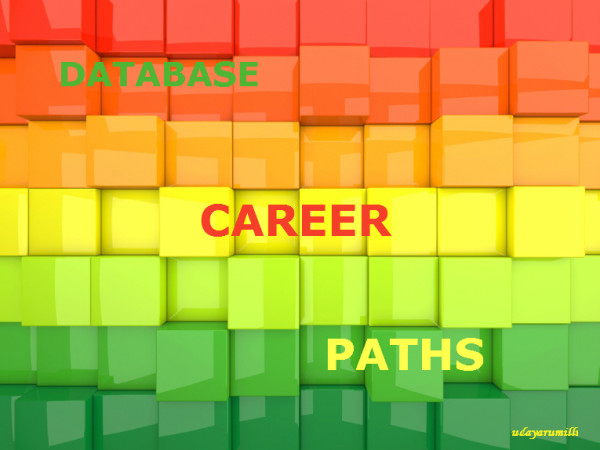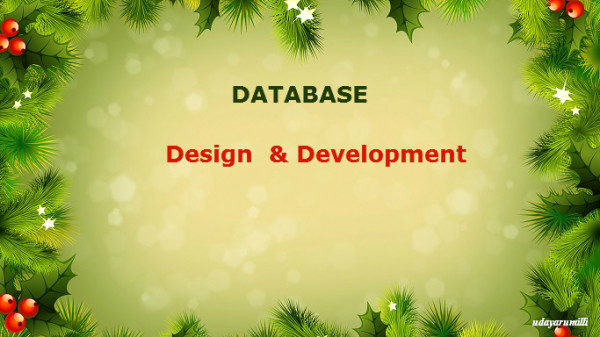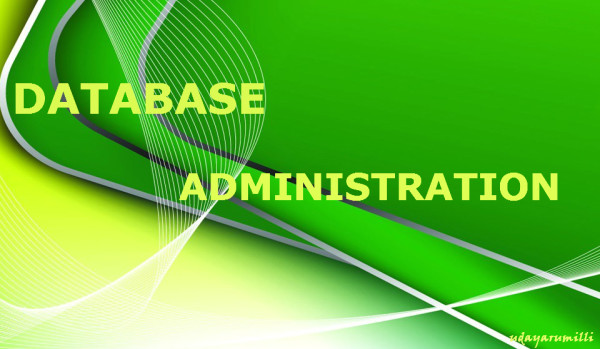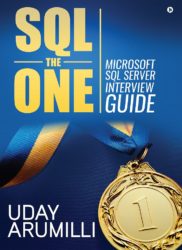Database Career Paths
As a blogger I usually get in touch with the followers to discuss on various databases related issues. If I need to give rating to the questions that I answered, Top 1 will be “How to become a successful Database Admin / Developer?” I tried my best in answering them. Now I thought of making it as a blog post which can be helpful for others as well.
If you are interested in database systems and want to make your career in database path, first you should get clarity on “DATABASE ROLES”
There are three basic paths available to make your career in database systems. Below are the 3 paths.
Database Designing & Development:
Database Designers and Developers design and develop a database to hold and process data to support a front-end application which enable end users to do transactions online.
Database Administration:
Database Administrators maintain the designed / developed systems to prevent the interruptions during the transactions.
Data Warehousing:
Data Warehouse teams analyze the captured data and process it to find out the area where the business can be extended or improved.
First let’s have a look on what are the various roles available in each path.
Database Environment Roles
Database Designing & Development:
- Database Architect
- Data Modeler
- Database Designer
- Database Developer / Engineer
Database Administration:
- Application / Development DBA
- Core DBA
Data Warehousing:
- ETL Developer
- Database Analyst
- Report Developer
- Data Scientist
- + Roles under Database Design and Development may also applies to this category
Now you have some idea what are the roles available. Now we’ll look into each role and its responsibilities. If you get a chance to choose, select the right path that suits your interest. Hope the below points help you out in choosing the right path.
Database Designing and Development
Nature:
They do architect, design and develop database systems that support On-Line Transaction (OLTP) Processing and On-Line Analytical Processing (OLAP). Most of the environments follow one of these frameworks “SDLC” or “AGILE”.
Database Architect (Business + Structure + Data + Operations):
Plan and execute the entire project and should have knowledge on all phases (Business + Technology). He / She should be able to answer all the questions related to database system.
Ex: Analyzing client operations and customer requirements, mapping business requirements to technology, designing secure and optimized database systems.
Data Modeler (Business + Data + Structure):
Work on mass / raw data and give a structure to that. To simply say that he / she will act as a bridge between business and IT. Means they understand the data and convert business requirements into conceptual, logical and physical models that suit the requirement.
Ex: Separating data and operations, Identifying Entities and Relations etc
Database Designer (Data + Structure):
From the requirement analysis he / she should be able to design database by following best practices.
Ex: Designing Databases, Tables, Datatypes, Capacity Planning etc
Database Developer/ Engineer (Operations):
Based on the design developer / engineer develop database code to fulfill the actual business requirement.
Ex: Creating Procedures, Functions, Views etc
These People…………………………………….
- Closely work with client / business team
- More chances to work at onsite
- More programming experience
- Can be expertise on a particular domain which is an added advantage
- Work is planned and mostly long term challenges
- Can see experts in SQL programming and business functionality
- Plays key role in building database systems
Database Administration
Nature:
They do maintain database systems to make sure databases / database servers are up and online by 24*7. Mostly DBA works in ITIL environments.
Application DBA:
Usually they work on Development, Test and Stag environments to support the database systems. Apart from database systems they should have knowledge on application configurations and business up to some extent.
Ex: Troubleshooting App-DB connectivity issues, Deploying Scripts, Debugging Scripts etc.
Core DBA:
Core DBA’s are who responsible for PRODUCTION database servers / databases.
Ex: Running Health Checks, High Availability, Troubleshooting issues, handles Service Requests, Problem Requests etc.
These People……………………………………………..
- Closely work with end customers / users
- Can be expertise in Technology Infrastructure field
- Mostly work from offshore
- Have to face unplanned outages
- Mostly have to face the daily challenges
- Most of DBA’s work in shifts
- Usually do not have much knowledge on business functionality
- Would see more experts in server and database internals
- Plays key role in database maintenance
Data Warehousing
Nature:
Deigning and creating a centralized repository and process the past trends to predict the future trends.
ETL Developer:
Design and develop an ETL (Extract Transfer Load) process to integrate data between various systems.
Ex: Developing SSIS packages to integrate data from legacy systems to SQL Server 2014.
Database Analyst:
Analyze the business requirements and confirms the project requirements. He / She analyze monitor data feeds and tune database systems when required.
Ex: Monitor test strategies to check they are matching with the requirements
Report Developer:
Design, create business reports that helps management to take the right decisions.
Ex: Creating sales reports using SSRS
Data Scientist:
The Data Scientist is responsible for designing and implementing processes and layouts for complex, large-scale data sets used for modeling, data mining, and research purposes.
These People:
- Closely work with business team and architects
- More chances to work at onsite
- More analysis experience and having knowledge on business functionality
- Can be expertise on a particular domain which is an added advantage
- Work is planned and mostly long term challenges
- Plays key role in decision making systems
- Mostly work with OLAP systems.
- Can see experts in data and business analysis
- Work with huge datasets
Resource Utilization
Remember these roles and responsibilities vary based on organization policies, management and environment. If below are the various phases in designing and developing a database.
- Requirement Gathering and Analysis
- Conceptual Design
- Logical Design
- Physical Design
- SQL Coding
- Testing
- Optimizing
- Version Maintenance
- Build
- Deploy
- Maintenance
Let’s see how resources allocated in different environments:
Enterprise Environment
- Database Architect
- Data Modeler
- Database Designer
- Database Developer
- Build Engineer
- Database tester
- DBA
Mid-level Environment
- Database Architect
- Database Developer
- DBA
Start-Up
- Database Engineer
- DBA
This is just an example how resource are utilized in various environments. It always depends on the business and budget.
Famous Database Systems
- Oracle
- Microsoft SQL Server
- IBM DB2
- My SQL
- SAP Sybase ASE
- Postgre SQL
- Teradata
- Informix
- Ingres
- MariaDB Enterprise




















Hello Uday, Thank you for your info, I have seen pulse update in linkedInn and found this info very useful. Moving forward I’m working in SAP Sales and Business Development and I’m looking to learn Some SAP module to make my footprints in tech or funtional side. I’m in great dilema where I should keep my efforts for my future. Please suggest me about SAP Sybase ASE, If I go by this will it help me to make my future in market. I’m in process now getting suggestions from experts like you and move forward. Note : I’m trained in… Read more »
Sasanka, To be frank I don’t have much exposure on SAP modules, but my knowledge Sybase ASE is a RDBMS just like other systems Oracle , SQL Server. This is basically designed for OLTP systems and mostly using in Insurance, Banking and Stock Exchange sectors. I have seen a fellow he is an expert in Microsoft Excel and he can talk the best English, he is charging 28 dollars per hour and you know what he is working from India. I would suggest, whatever technology or domain you choose as your career option, you need give some quality work, great… Read more »
[…] In Previous Post we can understand what are the various Paths in Database Career. […]
[…] Career Paths […]
Hello sir,
I am one of your blog reader and i am working now as a php developer and i ahve to work on mysql but I want to switch my carrier in ms sql dba . I already learn ms sql from online study materials and still I am practising all this things. I have 2 years of it experience. Please guide me how I have to plan to establish my carrier as sql server dba.
Thanks.
Hi Chakraborty, Happy New Year 2016. Did you check the career path for php + MySQL? There is a lot of opportunities for this skill set. Most of the mid-level organizations are offering good packages for PHP + MySQL. Also I have seen people who earn more than 2000$ per month through freelancing. I am just suggesting as you already experienced in the same path….anyway now come to your question…. SQL Server is a leading technology and offering world class jobs. Believe you are looking for Microsoft SQL Server Developer…. Right? First attend training (Class room / Online / Self),… Read more »
thanks, for your reply.But first of all I have to move my carrier as sql dba.So as per sql dba interviews and online study materials I have prepared myself.So please tell me what would be my next plan how I should move forward for getting first job as sql server dba .
Thanks.
Hi, For my knowledge for most of the IT companies will consider 2 years experience as a Trainee associate including SQL DBA. But yah there are lot of companies require SQL DBA with 2 years experience. Keep searching for jobs shocase that you have experience in SQL DBA, attend the interview once you get selected then you can tell them that you worked on MySQL with php but have good enough knowledge on SQL DBA to convince them to release offer. 2-3 Years DBA is expected to know below: Basic administration including Backup types, Restores, Jab Creation, Installing / Migrating… Read more »
hi uday,
I have experience of 1 year as an Oracle DBA.But now I am switching to the SQL Server DBA.But I am finding it hard to understand SQL Server concepts.Any advise from you?
Hi Gaurav, Sorry for the late reply. Well happy to here you are coming into Microsoft community. You might face few issues in understanding concepts initially but it’s not hard. To be more frank if you can understand one RDBMS it’s not a tough job to work on any other RDBMS. The way you perform a task is different but not the content. Ex if you understand what is a FULL and Transnational backup, more or less it is same on all RDBMS – Oracle, SQL Server, DB2 etc. However my suggestion is to understand the Core concepts, to do… Read more »
[…] Career Paths […]
Hi uday, I am learning SQL DBA in past 1 year. but now iam moving to learn MSBI SSIS and SSRS. pls tell me If I go by this will it help me to make my future.
Sorry for the late response.
BI is one of the top skill set. But do not stick to SSIS and SSRS, focus on PowerBI, Tableau, SAS, Pentaho etc.
All the best.
Thanks